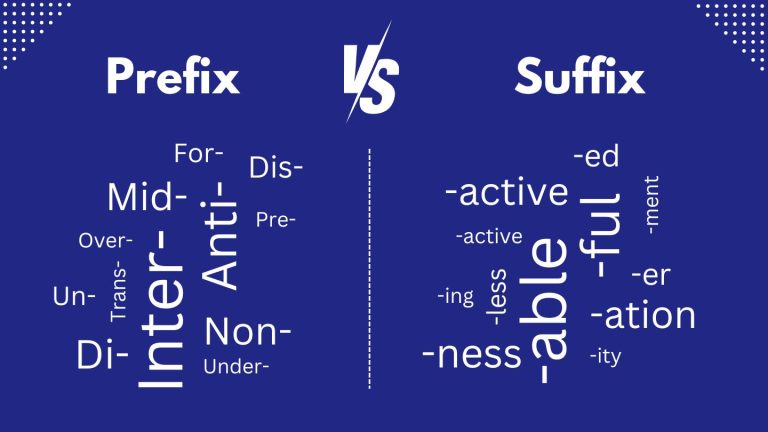Prefix vs Suffix: What’s the Difference?

Prefix vs Suffix
A prefix comes before the root of the word. For example, “unhappy” uses “un-” to mean not happy.
Suffixes go at the end and can change a word’s job in a sentence. Like “playful,” where “-ful” shows a quality of being full of play.
So, prefixes change what a word means, and suffixes change what a word does.
Common Prefixes
Prefixes are small but mighty parts of language that we attach to the beginning of words. These prefixes can turn a word into its opposite, show a direction, or indicate a number.
Here are some of the most common prefixes in the English language.
This table lists common prefixes, meanings, and examples.
| Prefix | Meaning | Examples |
| Anti- | against | antidote |
| Di- | opposite | defrost |
| Dis- | not/opposite of | disapprove |
| En-/Em- | cause to | encode/embrace |
| For- | before | forecast |
| In-/Im- | not | incomplete/imperfect |
| Il-/Ir- | not | illegal, irresponsible |
| Inter | between/among | interaction |
| Mid- | middle | midday |
| Mid- | wrongly | misunderstanding |
| Non- | not | nonsense |
| Over- | over | overreaction |
| Pre- | before | predetermined |
| Re- | again | rearrange |
| Semi- | half | semicircle |
| Sub- | under | submarine |
| Super | above | superiority |
| Trans- | across | transform |
| Un- | not | unkind |
| Under- | under | underdeveloped |
Common Suffixes
Common suffixes are the finishing touches that change how a word works in a sentence. They transform verbs into nouns, adjectives into adverbs, or give new qualities to words.
Here’s a table with the suffix, meaning, and example:
| Suffix | Meaning | Examples |
| -able/-ible | able to be | suitable/visible |
| -al/ial | having characteristics of | personal/influential |
| -ed | past tense verb | skipped |
| -en | made of | wooden |
| -er (comparative) | comparative | older |
| -er (one who) | one who | carpenter |
| -est | comparative | biggest |
| -ful | full of | beautiful |
| -ic | having characteristics of | iconic |
| -ing | present participle verb | shopping |
| ion/-tion | act/process | occasion/attraction |
| -ation/-ition | act/process | starvation/contrition |
| -ity/-ty | state of | scarcity/cruelty |
| -ive/-active/-itive | adjective from a noun | destructive/initiative/fugitive |
| -less | without | careless |
| -ly | characteristic of | quickly |
| -ment | action or process | achievement |
| -ness | state of/condition of | forgiveness |
| -ous/eous/ious | possessing the qualities of | famous/courteous/suspicious |
| -s/-es | more than one | shoes/dresses |
| -y | characterized by | dirty |
Suffixes come at the end of words. These little endings can help us express actions, qualities, states of being, and much more.
“Antidisestablishmentarianism” is one of the longest words with both prefixes and suffixes.
The Fun Side of Prefixes and Suffixes
Playing with prefixes and suffixes isn’t just educational. It can also be a lot of fun. One way is that you can mix and match them to create new words.
Here are some examples of invented words.
Invented words can be whimsical, insightful, or just plain fun. Try them out for yourself.
Prefixes vs Suffixes
Prefixes and suffixes help us change words to make new meanings. They can also make language fun and interesting, showing us how flexible and creative it can be.
We’d love to hear what you think. Drop a comment below with any cool prefixes and suffixes you’ve come up with. Let’s get creative together for our word inventions.
